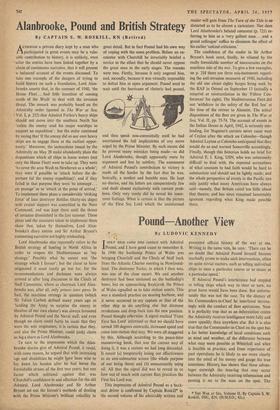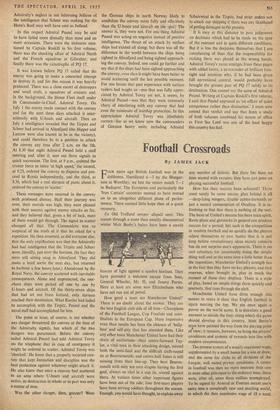Pound Another View
By LUDOVIC KENNEDY
T ONLY once came into contact with Admiral 1Pound, and I have good cause to remember it. In 1940 the battleship Prince of Wales was bringing Churchill and the Chiefs of Staff back from the Atlantic Charter meeting in Newfound- land. The destroyer Tartar, in which I then was, was one of the close escort. We and another destroyer had been stationed on the battleship's bows, but on approaching Reykjavik the Prince of Wales signalled us to take station astern. This was a standard practice on nearing harbour, and it never occurred to my captain or that of the other ship to do anything else but decrease revolutions and drop back into the new position. Pound thought otherwise. A signal marked 'From First Sea Lord' informed us that we should have turned 180 degrees outwards, increased speed and come into station that way. We were all staggered by this. Although according to the peace-time manceuvring book, that was the correct way of doing it, it was a custom we had long discarded. It meant (a) temporarily losing our effectiveness as an anti-submarine screen (the whole purpose of our being there) and (h) unnecessarily using oil. All that the signal did was to reveal to us how out of touch with current fleet practices the First Sea Lord was.
This impression of Admiral Pound as a back- seat driver is confirmed by Captain Roskill* in the second volume of his admirably written and presented official history Of the war at sea. Writing in the same vein, he says : 'There can be no doubt that Admiral Pound himself became markedly prone to make such interventions, often on quite trivial matters, such as telling individual ships to steer a particular course or to steam at a particular speed.'
If Admiral Pound's interference had stopped at telling ships which way to steer or turn, no great harm would have been done. But unfortu- nately this was not the case. To the dismay of his Commanders-in-Chief he interfered increas- ingly with the conduct of fleet operations. Now it is perfectly true that as an information centre the Admiralty receives intelligence more fully and more speedily than anywhere else. But it is also true that the Commander-in-Chief on the spot has a far better knowledge of local conditions such as wind and weather, of the difference between what may seem possible at Whitehall and what is feasible in practice; and from experience of past operations he is likely to see more clearly into the mind of his enemy and gauge his true intentions. History, has shown that these advan- tages outweigh the time-lag that may occur between the Admiralty receiving information and passing it on to the man on the spot. The * THE WAR AT SEA. Volume II. By Captain S. W. Roskill, DSC, RN. (H.M.S.O., 42s.) Admiralty's neglect in not informing Jellicoe of the intelligence that Scheer was making for the Horn's Reef may well have cost us Jutland.
In this respect Admiral Pound may be said to have failed more dismally than most and on ' more occasions. There were the instances men- tioned by Captain Roskill in his first volume; there was the shocking affair of Admiral North and the French squadron at Gibraltar; and finally there was the catastrophe of PQ 17.
It was known before PQ 17 sailed that the enemy was going to make a concerted attempt to destroy it; and for this reason it was heavily protected. There was a close escort of destroyers and small craft, a squadron of cruisers and, in the background, the Home Fleet itself under its Commander-in-Chief, Admiral Tovey. On July 1 the enemy made contact with the convoy and for the next three days attacked it inter- mittently with U-boats and aircraft. Then on July 4 intelligence revealed that the Tirpitz and Scheer had arrived in Altenfjord (the Hipper and Lutzow were also known to be in the vicinity), and could therefore be in a position to attack the convoy any time after 2 a.m. on the 5th. At 8.30 that night Admiral Pound held a staff meeting and, after it, sent out three signals in quick succession. The first, at 9 p.m., ordered the cruiser force to retire 'at high speed,' the second, at 9.23, ordered the convoy to disperse and pro- ceed to Russia independently, and the third, at 9.36, which had a real element of panic about it, ordered the convoy to 'scatter.'
. These messages were received in the convoy with profound dismay. Half their journey was over, their morale was high, they were pleased with their success against enemy attacks so far, and they believed that, given a bit of luck, most of them would get through. The signal to scatter changed all that. The Commodore was so sceptical of the truth of it that he asked for a repetition. He then assumed, as did everyone else, that the only explanation was that the Admiralty had had intelligence that the Tirpitz and Scheer were, literally, just over the horizon. (In fact they were still sitting snug in Altenfjord. They did make a brief sortie the next day, but returned to harbour a few hours later.) Abandoned by the Royal Navy, the convoy scattered with inevitable consequences. Alone and unprotected, the mer- chant ships were picked off one by one by U-boats and aircraft. Of the thirty-seven ships that had set out from Iceland, only thirteen • reached their destination. What Raeder had failed to accomplish with the Tirpitz, Pound and the naval staff had accomplished for him.
The point at issue, of course, is not whether any danger threatened the convoy at the time of the Admiralty signals, but which of the two dangers was paramount. Before the convoy sailed Admiral Pound had told Admiral Tovey on the telephone that in case of emergency it might be ordered to scatter. Admiral Tovey was 'shocked.' He knew that a properly escorted con- voy that kept formation and discipline was the best protection against whatever might attack it. He also knew that once a convoy had scattered in an area where U-boats and aircraft were active, its destruction in whole or in part was only a matter of time.
Was the other danger, then, greater? Were the German ships in north Norway likely to annihilate the convoy more fully and effectively than the U-boats and aircraft on the spot .' The answer is, they were not. For one thing Admiral Pound was acting on negative instead of positive intelligence. The threat of an attack by surface ships had existed all along; but there was all the difference in the world between the ships being sighted in Altenfjord and being sighted approach- ing the convoy. Indeed, one could go further and say that if the ships had been sighted approaching the convoy, even then it might have been better to avoid scattering until the last possible moment. For one lesson that past experience with surface raiders had taught us—one that was fully appre- ciated by Admiral Tovey yet not, it seems, by Admiral Pound—was that they were extremely chary of interfering with any convoy that had even the minimum of warship protection. In this appreciation Admiral Tovey was absolutely correct—for as we know now the commanders of German heavy units, including Admiral Schniewind in the Tirpitz, had strict orders not to attack our shipping if there was any likelihood of getting damaged in the process.
It is easy at this distance to pass judgement on decisions which had to be made on the spur of the moment and in quite different conditions. But it is less the decisions themselves that I aim complaining of than that the responsibility for making them was placed in the wrong hands. Admiral Tovey's name emerges from these pages with added lustre; a commander of brilliant fore- sight and intuition who, if he had been given full operational control, would probably have brought the greater part of PQ 17 safely to its destination. One cannot say the same of Admiral Pound. Writing of Captain Roskill's first volume, I said that Pound appeared as 'an officer of quiet competence rather than distinction': I must now amend that verdict and say that from a study of both volumes combined his tenure of office as First Sea Lord was one of the least happy this country has had.































 Previous page
Previous page